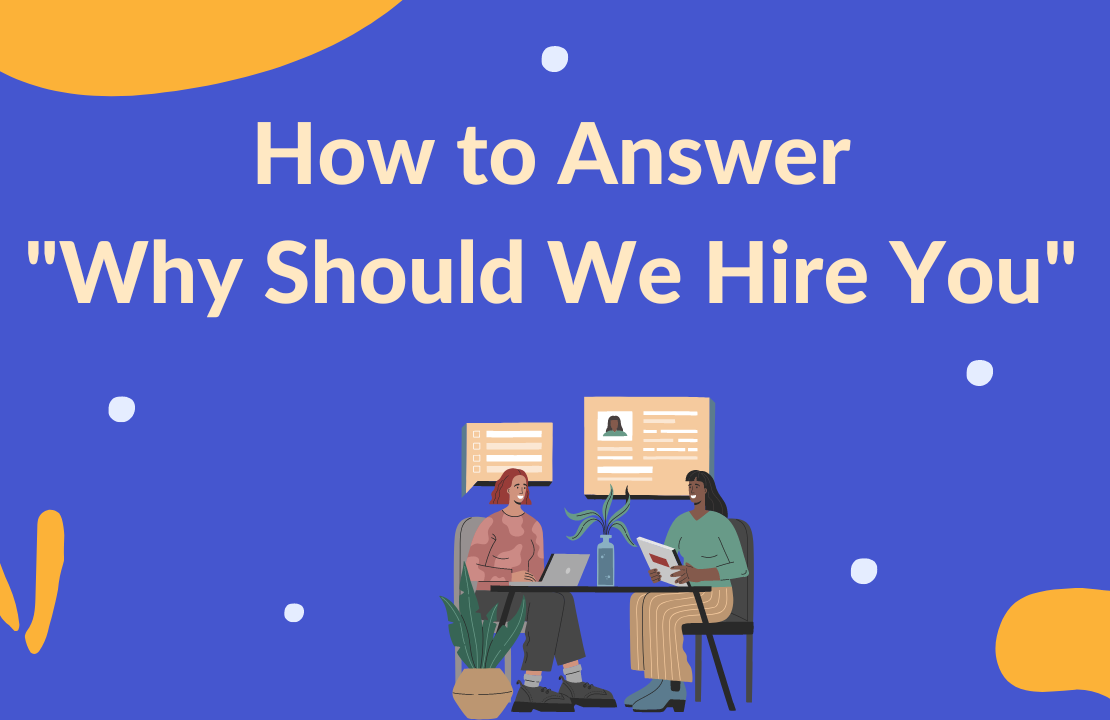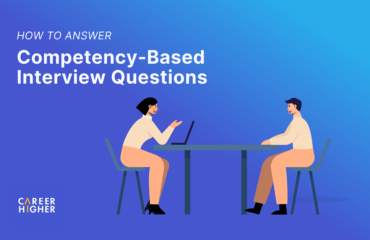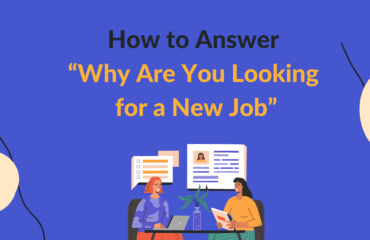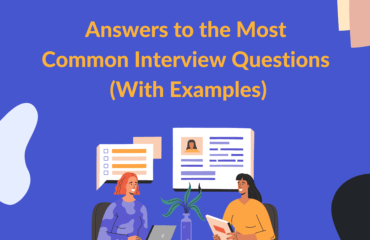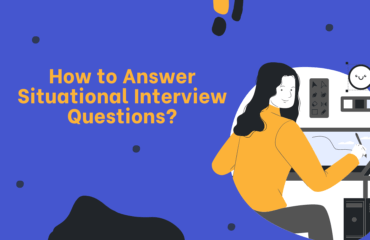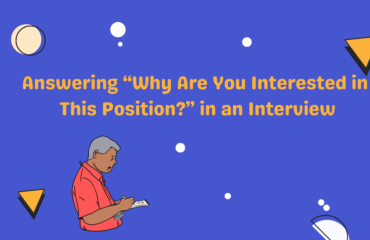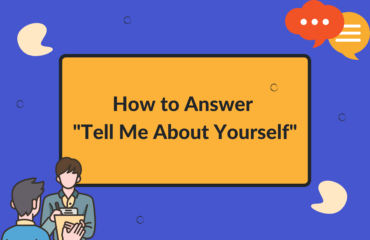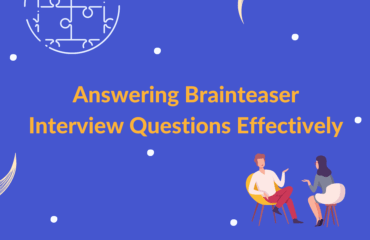Table of Contents
Interviews are one of the most daunting parts of every hiring process. It is where the recruiter gets to assess your fit for the role by speaking to you, analyzing your skills and personality, and matching it to the organization’s requirements. While this can seem intimidating if you don’t have expert assistance, ensuring you are prepared can ease the process.
No two interviews are the same, but there are a few common interview questions that you could focus on. And that brings us to today’s focus; the question “why should we hire you?”, how it fits into the interviewer’s agenda, and how to craft an effective answer for the same.
Why Do Interviewers Ask The Question “Why should we hire you”?
To put it simply, this is a “call to action” or a window of opportunity for you to “sell yourself” as the undoubted best choice for the job. Although it seems like a simple and straightforward question, it plays a critical role in your interview. When an interviewer asks you this question, they’re hoping to hear from you about the following.
- How do your skills match the job role
- How do your values and goals fit the company
- And how your industry experience brings in additional value
They are also looking to estimate how interested you are by understanding if you’ve taken the time and effort to research the job. One survey showed that 88% of recruiters preferred to hire an “informed candidate”, someone who has done their research before the interview.
Finally, since this is your first chance to speak directly to the recruiter, it serves as a great opportunity to build rapport with the interviewer by showcasing your “personal brand”. While the question itself is integral to most interviews, it can be put forward in several ways. Here are some of the most common variations:
- Why should we hire you for this role?
- What makes you unique?
- Why do you think you’re a good fit for this position?
- Why are you the best candidate for this job?
- How does your experience make you best suited for this job?
- Tell us why you think you’re the perfect hire…
How to Answer The Question “Why Should We Hire You”
Now that we have some background on why recruiters ask this question, we can move on to preparing the best answer. The process may seem daunting at first, but it’s fairly simple if you follow a few simple steps. Do keep in mind that this process may need to be repeated several times. Your answer will change based on the job you are applying for. To use this as a guide, we suggest you start at step one each time. The key is to keep the answer precise and tailored to each opportunity.
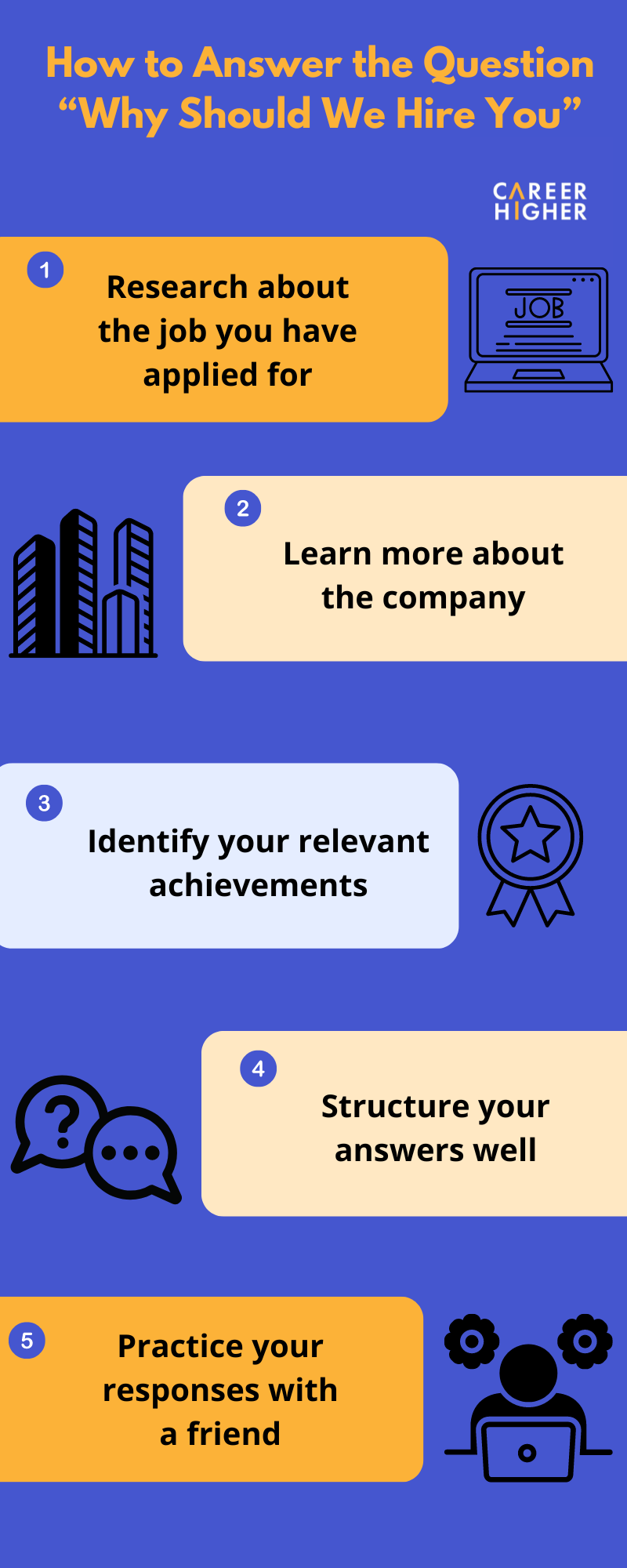
1) Research the job and its responsibilities
This starts with something as simple as analyzing the job description. Head back to the job board or email that led you to the job and read through the description again. Look for and make a note of the following:
- Focus on the “requirements section” of the job description and make a note of the top-most bullet points as these are generally the most important scope of work.
- Note down pointers mentioned under “essential requirements” for the candidate. These depict the minimum requirements that must be met for the job.
- Read through the duties and responsibilities. Identify matches with your previous experience.
- Collate a healthy mix of both the soft and hard skills necessary. Ignoring soft skills is not advised. In fact, most recruiters look for them. You can take a look at this survey to see what soft skills are most sought-after.
- Read through the Key Performance Indicators for the job (if mentioned) or the target goals assigned to the role. These will give you an idea of the growth and contribution that is expected of you.
Let’s look at an example. The following is a sample job description for a Digital Marketing Manager.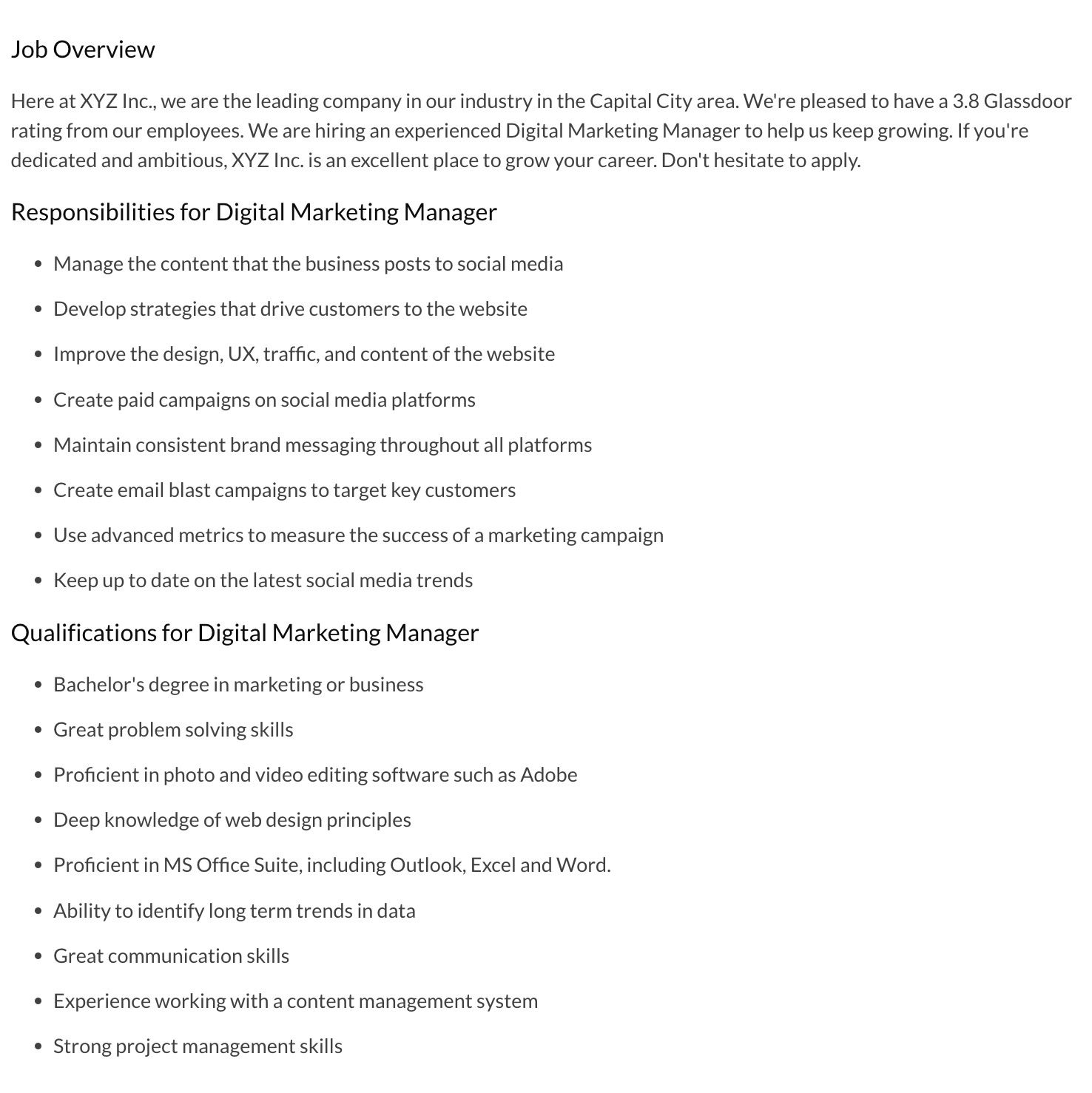
Here’s what we need to pay attention to here
- Skills: Project management, UX design, content management, email marketing, increasing web traffic, and data analysis
- Technology and tools: Adobe, MS Office Suite, Content Management Systems (possibly an analytics software)
- Managerial skills: Though the duration is not mentioned, “project management skills” have been highlighted in the description
- Outcomes: Increasing traffic to the website, creating consistent brand messaging, measuring and monitoring campaign performance
To expedite the process, you could also run the job description through a “resume optimization software” to identify the keywords that light up. The software can speed up your research by comparing the highlighted keywords with your resume and pointing out the matches and the missing skills. That should give you a fair idea of what specific skills you should focus on.
2) Research the company
The next step is researching your target company. You want the interviewer to understand that your values and goals align with the culture and vision of the company. Go through the company’s website, visit their LinkedIn and other socials, and find the latest press on the company. Your goal is to get an estimate on the direction of the company, the background they come from, the goals they hope to achieve, the activities they indulge in as a team, and so on.
To help your research move faster, you could look up the company on sites like Crunchbase that give you background details such as funding rounds, direction, founders, etc. You could head to the company’s page on Glassdoor to learn more about the culture, opinions of other employees, and so on. The company’s social media pages may also provide information on company culture and activities. Once you have your research taken care of, you’ll get a fair idea of what the ideal “cultural fit” looks like.
3) Identify your relevant achievements and skills
Now that you’ve collated key values and skills based on the company’s requirements, you’d need to go a step further and connect them to yourself through your key achievements. Focus specifically on projects you’ve carried out, certifications, awards, recognition, managerial or leadership experience, or even personal learning endeavors that could directly or indirectly contribute to the company. You could also highlight anecdotes and learnings that may be relevant to the job you’re applying for.
For example, if the company you worked with went through the same stage of growth or faced similar challenges, you could talk about the role you played in overcoming them and the results achieved. Say you’re applying to a company that is hoping to scale its revenue through focused lead-generation efforts. And you, at your previous job, were able to generate X amount of revenue in Y amount of time using your lead-gen strategy. You had to study lead-gen and improve your skills to be able to achieve those results. This makes for a great highlight of your experience and ties you to the job effectively.
Let’s look at another example to clear things up. You’re applying to a digital marketing role where ‘growth in organic traffic’ is a highlighted goal. Now if at your previous job, you managed and executed an “organic traffic campaign”, you’d want to highlight the results you achieved. Maybe you adopted unique platforms to increase traffic, you possibly picked up some new skills along the way such as graphic design or SEO analysis. Describing this project would show your managerial skills, your ability to plan and create campaigns, and also proven success in driving traffic (which is an explicit necessity).
4) Structure your answer
Steps one through three, when executed correctly, should leave you with a large list of keywords, skills, and highlights. You would also have a sense of the company’s direction and goals. You would then need to begin structuring and creating your “pitch”.
When working on the structure, be sure to keep it concise and to the point. Ensure you time your answer and limit it to anywhere between one to two minutes. Talking too much in a job interview is often looked down upon. Therefore, structuring your answer is something you’d need to spend an especially large amount of time on. If you’re unsure of how to do so, you could always enlist the help of a professional and get “interview ready”.
Now moving into the content…
- Begin by acknowledging the question itself and express your enthusiasm for answering the question.
- Select three to four key skill highlights from your research and draw parallels to the job role. Add them into one or two sentences and limit elaborating on them.
- Then add any metrics or data that speak to your achievements and experience. Drive focus on the results that you have achieved.
- Finally, ensure that you show passion for the job and the growth of the company by briefly talking about your own career goals and how they align perfectly with the company. This would lead the recruiter to believe that you would be more driven than others since you’d be achieving your own personal goals at work too.
5) Practice your response
Now that you have the perfect answer, you can move on to working on its presentation. Confidence is key in any interview and it is of paramount importance when you’re pitching yourself. Since this answer is make-or-break, it’s best to be prepared.
Try practicing the answer by reading it out loud in front of a mirror or recording yourself saying it out loud. This would ensure you don’t miss out on any key information and could also help you work on your confidence. You could also try taking up a mock interview to help check your preparedness.
Following the steps mentioned above should lead you right to the perfect answer to “why should we hire you for this role”. However, if you’re just getting started or are overwhelmed by information, you may need some extra help. In such instances, you may turn to templates that can help hasten the process. So we’ve collated some great examples for you.
Example Answers For “Why should we hire you for this role?”
Example 1: For Managerial Positions
“Glad you asked… After spending some time going through the job description, I came to understand that I likely possess the right skills for the job. From what I gather, it appears that the company is hoping to achieve <company goals> in the coming months.
I believe that my experience managing large teams and working on <skills or projects> would act as a catalyst in reaching the organization’s goals. I have previously been able to put my skills to good use at my workplace achieving <results or metrics>
Given the fact that my personal career goal of <mention a long-term career goal> matches the goals of the company, I believe that I would be especially driven in this role.”
What we love: Shows passion, shares useful metrics, drives focus to experience gained
Example 2: For Mid-career Positions
“Working in the industry for <number of years> years has allowed me to accumulate the knowledge required for the job. Since you’re looking for someone with mid-level experience, I understand that the need is for someone who comes with appropriate experience but also has room for growth and learning.
Taking into account my career trajectory and interests, I would be ideally suited. Additionally, my time at <previous job roles and companies> has taught me valuable skills such as <relevant skills> which would serve us well as a team.”
What we love: Shows that the candidate has researched the job, shows enthusiasm to learn, and draws attention to skills gained through experience
Example 3: For Career Switching (when you’re looking for a job in a different field)
“Firstly, I’d like to thank you for allowing me to answer this question. Since my experience has not been in this field, it is natural to wonder if I’d be the right fit.
That said, I am confident that I would be able to serve this role well, above and beyond what is expected of me. My time working with <skills or projects> gives me unique experience that can be applied to <projects or job responsibilities mentioned in the JD>.
My varied expertise can bring a fresh perspective to the table and ultimately drive the company towards progress.”
What we love: Shows drive and passion, focuses on transferable skills, provides scope for future growth
Example 4: For Programmers
“Glad to be able to address this. While I worked as a software engineer at <company(s)> I was responsible for the development of various key projects such as <projects and technologies> & <projects and technologies>. Through these projects, I was able to expand my knowledge base while simultaneously completing projects on time and efficiently. That said, the scope for improvement was limited.
I am now looking for a new challenge. A role that pushes my limits and encourages me to learn more and build on my skills. I believe that this position would provide me with that opportunity.”
What we love: Shows the candidate has researched the job, focuses on technical skills, talks about previous projects and meaningful results, and speaks on a passion for learning and growth
Example 5: For Creative Professionals
“I have always been a creative person and <design or writing> was an obvious choice when it came to my career. At my previous job, I was seen as someone who could bring new ideas to the table and enable positive change in the creative process within the team.
After gaining <number of years> years of experience and picking up new skills, I am now looking for a job that furthers my creativity. Reading through the job brief and looking up the company, led me to the conclusion that I would be adequately challenged and engaged by the work at your organization. I also believe that some of my cross-functional skills, such as <skills> & <skills>, would add a new dimension to the role.
I see this opportunity as one that would benefit both the company & me.”
What we love: Starts off by drawing attention to passion, shows enthusiasm for the company, and shows the candidate is aware of necessary advancement in their skills
What Not To Do
Now that we’ve been through all the right things to do and a few templates to get you started let’s look at the “don’ts”. Even the best-planned responses may fall short if not executed well. Understanding what pitfalls you must avoid can bridge that gap for you.
1) Lack of preparation
Being under-prepared is the absolute worst thing you can do for an interview. Before you head to the interview, you ought to have researched the company, prepared your answers, and gotten adequate practice. Additionally, being prepared leaves a good impression on the interviewer.
2) Being too general
When you’re answering the question “why should we hire you”, you are trying to prove to the recruiter that you are the obvious and only choice that is good for them. To do so, you need to get into the nitty-gritty and ensure that your answer is tailored to address their specific needs. Focus on the job, the company, and the expected results.
3) Talking too much
While speaking less or forgetting to share what’s important is a big no, talking too much can irk the interviewer too. Your goal is to find the right balance and speak for the appropriate amount of time. Keep your answers to a maximum of two minutes and ensure that your communication is clear and valuable.
4) Talking only about yourself
Yes, the question refers to “you” the person. But, the answer itself should be about the synergy between you and the job. You would want to avoid talking excessively about yourself and when addressing your skills, make sure you’re drawing parallels between your skills and the job.
And with these simple steps, you can craft the ideal answer to the make-or-break question, “why should we hire you”. A little bit of research, analysis of the jobs, well-thought-out content, and a bit of practice is all you need to stand out from the crowd. If all that information was a little too overwhelming and you need some additional support, you could always reach out to our career experts for some assistance. You could also take a look at our extensive collection of resources that can help you prepare for your interview and job search.
